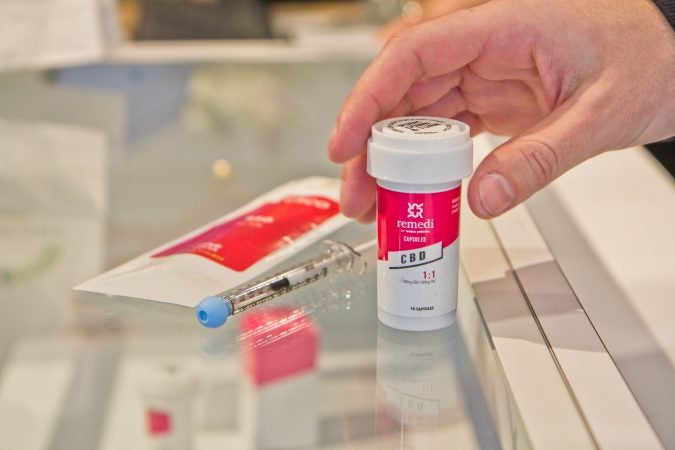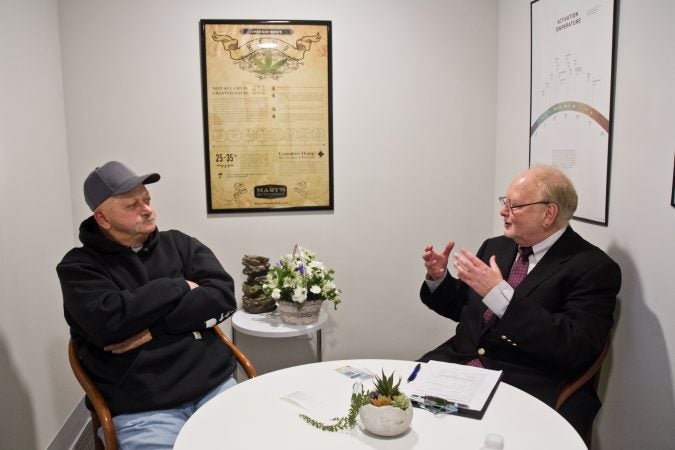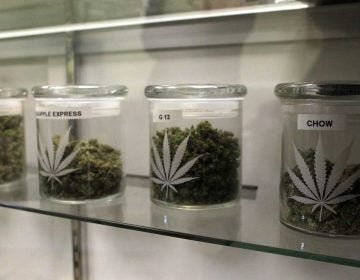Southeast Pennsylvania’s first medical marijuana dispensary opens
Chief medical officer of new Pennsylvania dispensary is hoping doctors will begin recommending medical marijuana for patients instead of more addictive opioids.
Listen 1:55-

Cancer Patient Robert Brown and his sister Marion make the first purchase at The Keystone Shops. (Kimberly Paynter/WHYY)
-

Cancer Patient Robert Brown and his sister Marion make the first purchase at The Keystone Shops. (Kimberly Paynter/WHYY)
-

The Keystone Shops is located at 420 Lancaster Avenue in Devon, Pa. (Kimberly Paynter/WHYY)
-

Robert Brown, a cancer patient, meets with Dr. Van De Beek at the Keystone Shops. (Kimberly Paynter/WHYY)
-

After finishing his last chemotherapy session, Robert Brown attends an appointment at one of Pa.’s first medical marijuana dispensary. (Kimberly Paynter/WHYY)
-

The Keystone Shops is located at 420 Lancaster Avenue in Devon, Pa., in a former Dairy Queen. (Kimberly Paynter/WHYY)
Southeast Pennsylvania’s first medical marijuana dispensary opened its doors Friday in an old Dairy Queen building in Devon, Chester County. Doctors at Keystone Shops were ready to see patients with an appointment — and one of 17 conditions the state deems eligible for the therapy.
Bobby Brown of Bucks County was one of the first patients to meet with Dr. Louis Van de Beek, Keystone’s chief medical officer.
“What brings you in today, Bobby?” asked Van de Beek.
“I was diagnosed with cancer about a year ago, and I’ve been going through chemotherapy,” answered Brown.
In fact, Brown’s sister drove him to the dispensary straight from his latest chemotherapy session. They told Van de Beek that while Brown was in treatment, a friend gave him some CBD droplets — the compound in marijuana that is not psychoactive.
It really helped him, they said.
It’s something that Van de Beek, who has run a private primary care practice in Kensington/Upper Port Richmond in Philadelphia for 28 years, has heard before.
He became interested in working with medical marijuana as he heard his patients speak anecdotally of using pot to self-medicate when they were experiencing pain — but without any control over dosage or quality.
And he’s eager to see if doctors will begin recommending medical marijuana for patients instead of more addictive opioids.
A path beyond opioids?
“There’s no shame in not wanting to experience pain — and there’s no shame in wanting to help somebody not experience pain,” said Van de Beek. “But there’s a real temptation to use what works the fastest. It’s ironic that our greatest pride in being able to help our patients not experience pain is now our greatest embarrassment.”
Van de Beek stressed that it’s not possible to fatally overdose on marijuana in the same way as heroin or prescription opioids. For that reason, he hopes that the availability of medical marijuana will help doctors prescribe it as a substitute for opioids, as well as a way to wean people off an addiction they may already have.
“If we do nothing more however than decrease the dose to a safe level where overdose and death cannot occur, that’s a tremendous success,” he said.
There is data to support this notion. Studies have found that states where medical marijuana is legal see lower rates of fatal overdoses than in states without similar laws. And more recent research has found that doctors do prescribe fewer opioids when medical marijuana is an option.
At the dispensary, Van de Beek worked with Brown to determine the best dosage and ingestion method, then handed him off to the store technicians to select the most appropriate product for his needs.
Pennsylvania has 11 approved growers, but only one is ready to supply the state’s open dispensaries. That means options are low and prices are high. A week’s supply of medical marijuana product — depending on the content, item and the patient — can run anywhere from $40 to $115. Brown walked spent $146.
Here’s how it works
If you believe you qualify with one of the 17 conditions — including MS, ALS, Crohn’s disease, autism, epilepsy and cancer — visit your primary care physician or another doctor certified by the state to authorize a medical marijuana card.
So far, 376 Pennsylvania doctors have completed the training and are certified practitioners with the program, and 4,000 patients have been certified by a physician to participate in the program. Three thousand four hundred have received their ID cards and can visit a dispensary, according to the Pennsylvania Department of Health.
Once you receive your ID card, you can visit a dispensary. By the end of the weekend, six will be open and operating throughout the state, with Keystone Shops the only dispensary in southeast Pennsylvania.
Keystone’s grand opening is Saturday and walk-ins will be welcome.
WHYY is your source for fact-based, in-depth journalism and information. As a nonprofit organization, we rely on financial support from readers like you. Please give today.





